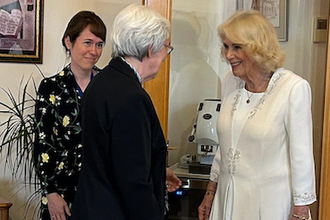Sunday Reflection with Canon Robin Gibbons: October 26th 2025

Tissot Pharisee and Publican 1894 Brooklyn. Wiki image
Thirtieth Sunday in Ordinary Time
Those who enter into that extraordinary yet simple relationship with the Living God in prayer, often find that their spiritual journey is not only adventurous at times, but sometimes has moments when they also face the aridity of absence, of a type of desolation where the Lord appears not to be present. The great spiritual guides are clear that this can be part and parcel of an engagement where one is called into a deeper stage of encounter, it is not however capricious, for one thing not everybody will experience this, there is always the presence of God even in hidden moments, it is then we need to remind ourselves of what the words of Sirach say to us:
"The prayer of the lowly pierces the clouds;
it does not rest till it reaches its goal;
Nor will it withdraw till the Most High responds,
judges justly and affirms the right." (Sirach 35: 21,22a)
Implicit in these words is the truth that nobody is cut off from the adventure of a relationship with God, and that the gift of a humble heart is important. Why is this?
Our Gospel provides us with the answer in the parable of the Pharisee and the tax collector. Here Jesus is teaching us the importance of praying with the right attitude, and he does this by contrasting two very different people each saying their prayers in the Temple. One is the religiously observant Pharisee, the other a despised category of people, a tax collector. Jesus points out to us that the key to reaching God's heart is a humble and contrite heart, one that takes away any form of pretentiousness and leaves the raw truth of who one is. This is the tax collector whose prayer is one of the simplest and yet most powerful :' 'O God, be merciful to me a sinner.' (Lk 18:13)
This is prayer at the edge of things, where words cannot ever say what is in the heart and where one feels so inadequate and unworthy faced with the immensity of God. Yet, it is here where we can do nothing else except say 'help me' to God, that the breakthrough with God comes and our prayer is heard. How it is answered depends on many things, but essentially it starts in that conversion of our hearts that helps us change our lives bit by bit and slowly.
We will still make mistakes, fall down again and again, but once the touch of the heart of God , found for us in the many presences of Christ, has entered into us we can never be the same, and little by little we will find that we begin lift up our face to see the radiance and love of the Holy One. And what of the Pharisee? It is clear that his prayer is not centred on God, Jesus is stark in suggesting that he " spoke this prayer to himself, 'O God, I thank you that I am not like the rest of humanity-greedy, dishonest, adulterous-or even like this tax collector".(Lk 18:11) it is an arrogant, censorious prayer focussed on what he perceives are important, but in doing so he reveals to us how we are not to pray. I suppose most of us would recognise that any prayer that begins with thanking God for what we are not, is either very insensitive towards others, or shows a marked immaturity in the values we hold dear in terms of faith. And yet the tendencies of the Pharisee is in each one of us . We might not recognise them, but if we hold prejudicial attitudes towards others, are we not, in some way, suggesting we are better than they are? The Pharisee has one saving grace, he articulates his selfish, stubborn heart, and that is enough for the love of God to respond to him. In time, I would hope his own conscience might trouble him as the words of Jesus in the gospel began to enter his heart. The prayer of the tax collector isn't simply a prayer for himself, asking for mercy also brings great mercy through him towards others. That is why the longer articulation of his prayer, what we know as the Jesus prayer is one that touches us all.
I have an instinct that though on this occasion the Pharisee might not have been justified, that prayer of the tax collector would also be for him as well. If you pray either that simple prayer of the tax collector or use the longer form hallowed by tradition: 'Lord Jesus Christ, son of the living God, have mercy on me a sinner', you will discover that your prayer isn't only for yourself, but extends outwards towards all who are gathered in your heart.
Lectio
Metropolitan Anthony Bloom
More than any other prayer, the Jesus Prayer aims at bringing us to stand in God's presence with no other thought but the miracle of our standing there and God with us, because in the use of the Jesus Prayer there is nothing and no one except God and us.
Francis of Assisi
Where there is Love and Wisdom, there is neither Fear nor Ignorance.
Where there is Patience and Humility, there is neither Anger nor Annoyance.
Where there is Poverty and Joy, there is neither Cupidity nor Avarice.
Where there is Peace and Contemplation, there is neither Care nor Restlessness.
Where there is the Fear of God to guard the dwelling, there no enemy can enter.
Where there is Mercy and Prudence, there is neither Excess nor Harshness.
St. Romuald's Brief Rule For Camaldolese Monks
Sit in your cell as in paradise.
Put the whole world behind you and forget it.
Watch your thoughts like a good fisherman watching for fish,
The path you must follow is in the Psalms - never leave it.
If you have just come to the monastery,
and in spite of your good will you cannot accomplish what you want,
take every opportunity you can to sing the Psalms in your heart
and to understand them with your mind.
And if your mind wanders as you read, do not give up;
hurry back and apply your mind to the words once more.
Realize above all that you are in God's presence,
and stand there with the attitude of one who stands
before the emperor.
Empty yourself completely and sit waiting,
content with the grace of God,
like the chick who tastes nothing and eats nothing
but what his mother brings him.


















